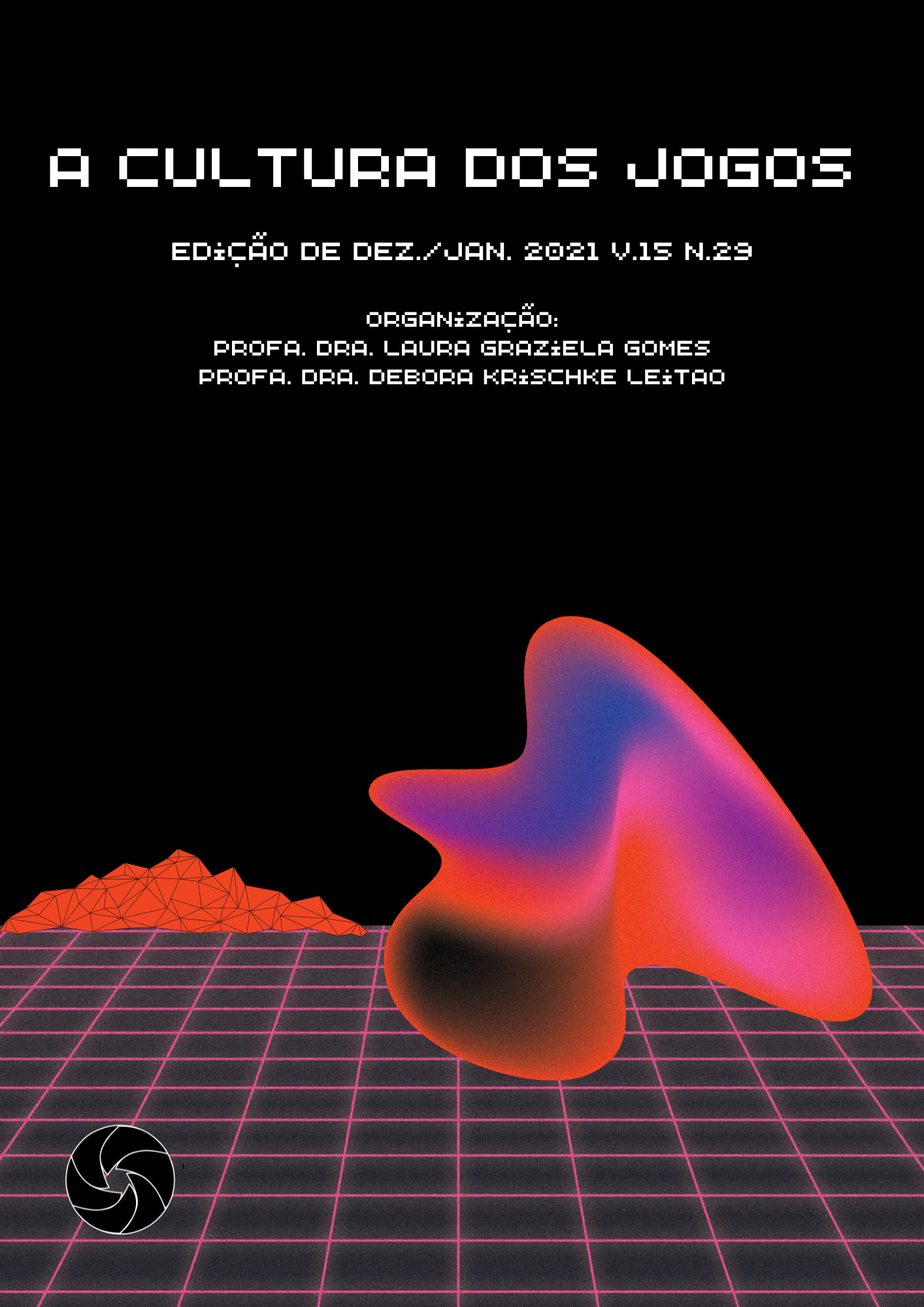Can videogame empower anyone? Reflections about a teaching proposal for authorial narrative games development.
DOI:
https://doi.org/10.5433/2237-9126.2021v16n29p295Keywords:
Video games, Narratives, Authorial Narratives, Teaching, Digital Games DevelopmentAbstract
This article presents a reflection about the conceptualization of games and narrative to raise a debate about authorial narrative videogames focused on the expression of themes related to social vulnerabilities. Based on relevant works from previous moments about media democratization and on a consequent call to action in adoption and divulgation of tools and strategies to amplify access to knowledge and practices for games development, it was presented some issues in the contemporary context of the system of videogames production and distribution to, thus, share a report of teaching experiences for the development of these interactive text-based games.Downloads
References
BROWN, T. Design Thinking: Uma Metodologia Poderosa Para Decretar o Fim Das Velhas Ideias. Rio de Janeiro: Alta Books, 2020. Copyright de 2009.
BURRILL, D. A. Die Tryin: Videogames, Masculinity, Culture. Nova York: Peter Lang Publishing, 2008.
DONOVAN, T. Replay: The History of Video Games. Lewes: Yellow Ant, 2010.
DYER-WITHEFORD, N.; PEUTER, G. Games of Empire: Global Capitalism and Video Games. Minneapolis: University of Minnesota Press, 2009.
FRASCA, G. Videogames of the Oppressed: Videogames as means for critical thinking and debate. Dissertação de Mestrado. Georgia: Georgia Institute of Technology, 2001
FRASCA, G.; ITO, M.; ZIMMERMAN, E. Videogames of the Oppressed: Critical Thinking, Education, Tolerance, and Other Trivial Issues. In Harrigan, P. & Wardrip-Fruin, N. (Org.). First Person: New Media as Story, Performance, and Game. (pp. 85-94) Massachusetts: The MIT Press, 2004.
HUIZINGA, J. Homos ludens: o jogo como elemento da cultura. São Paulo: Perspectiva, 1980. Copyright de 1938
HUNICKE, R.; LEBLANC, M.; ZUBEK, R. MDA: A formal approach to game design and game research. Disponível em: https://users.cs.northwestern.edu/~hunicke/MDA.pdf. Acesso em: 30 mar. 2021. Copyright de 2004.
KLEPEK, P. “What Happens When You Hate The Thing You've Made”. Kotaku, set. 2015, disponível em: https://kotaku.com/what-happens-when-you-hate-the-thing-youve-made-1735690650. Acesso em: 30 mar. 2021.
KIM, A. Game Thinking: Innovate Smarter & Drive Deep Engagement with Design Techniques from Hit Games. Gamethinking.io, 2018.
LANDOW, G. P. Hypertext 3.0: Critical Theory and New Media in an Era of Globalization. Baltimore: Johns Hopkins University Press, 2006.
OLSON, D. R. O Mundo no Papel: As implicações conceituais e cognitivas da leitura e da escrita. São Paulo: Editora Ática, 1997.
ONU NEWS. Estudo da ONU revela que mundo tem abismo digital de gênero. Disponível em: https://news.un.org/pt/story/2019/11/1693711 Acesso em: 30 mar. 2021.
ONU NEWS. Metade dos alunos fora da escola não tem computador em casa. Disponível em: https://news.un.org/pt/story/2020/04/1711192 Acesso em: 30 mar. 2021.
PIMENTEL, L. A. “Visión autoral/vision figural: una mirada desde la narratología y fenomenología". Acta poética. vol.27 no.1 México abr./may. 2006. Disponível em: http://www.scielo.org.mx/scielo.php?script=sci_arttext&pid=S0185-30822006000100012 Acesso em 13 mar. 2021.
POZO, T. “Queer Games After Empathy: Feminism and Haptic Game Design Aesthetics from Consent to Cuteness to the Radically Soft”. Game Studies, vol. 18, ed. 3, Dez. 2018. Disponível em: http://gamestudies.org/1803/articles/pozo. Acesso em: 30 mar. 2021.
RYERSON, L. Duke Nukem’s Dystopian Fantasies. Jacobin, New York. Abr. 2017. Disponível em: https://www.jacobinmag.com/2017/04/duke-nukems-dystopian-fantasies/. Acesso em: 30 mar. 2021.
RUBERG, B. Video games have always been queer. Nova Iorque: NYU Press, 2019.
SCHREIER, J. Sangue, suor e pixels: Os dramas, as vitórias e as curiosas histórias por trás dos videogames. São Paulo: HarperCollins Brasil, 2018.
SUSI, T., JOHANNESSON, M.; BACKLUND, P. Backlund. Serious Games – An Overview. Technical Report, Nov. 2015. Disponível em: https://www.researchgate.net/publication/220017759_Serious_Games_-_An_Overview . Acesso em: 30 mar. 2021.
STANZEL, F. K. A theory of narrative. Cambridge: Cambridge University Press, 1986. Copyright de 1972.
TRIPP, D. “Pesquisa-ação: uma introdução metodológica”. Educação e Pesquisa, São Paulo, v. 31, n. 3, p. 443-466, Set./Dez. 2005. Disponível em: https://www.scielo.br/j/ep/a/3DkbXnqBQqyq5bV4TCL9NSH/?format=pdf&lang=pt Acesso em: 26 out. 2021.
Downloads
Published
How to Cite
Issue
Section
License
Domínios da Imagem adopts the Creative Commons Attribution 4.0 International License, therefore, the copyrights related to the published articles belong to the author(s), who grant the journal the exclusive right of first publication.
Under this license it is possible to: Share - copy and redistribute the material in any medium or format. Adapt - remix, transform, and build upon the material, giving due credit and providing a link to the license and indicating if changes were made.











 The works in this journal are licensed under Creative Commons .
The works in this journal are licensed under Creative Commons .